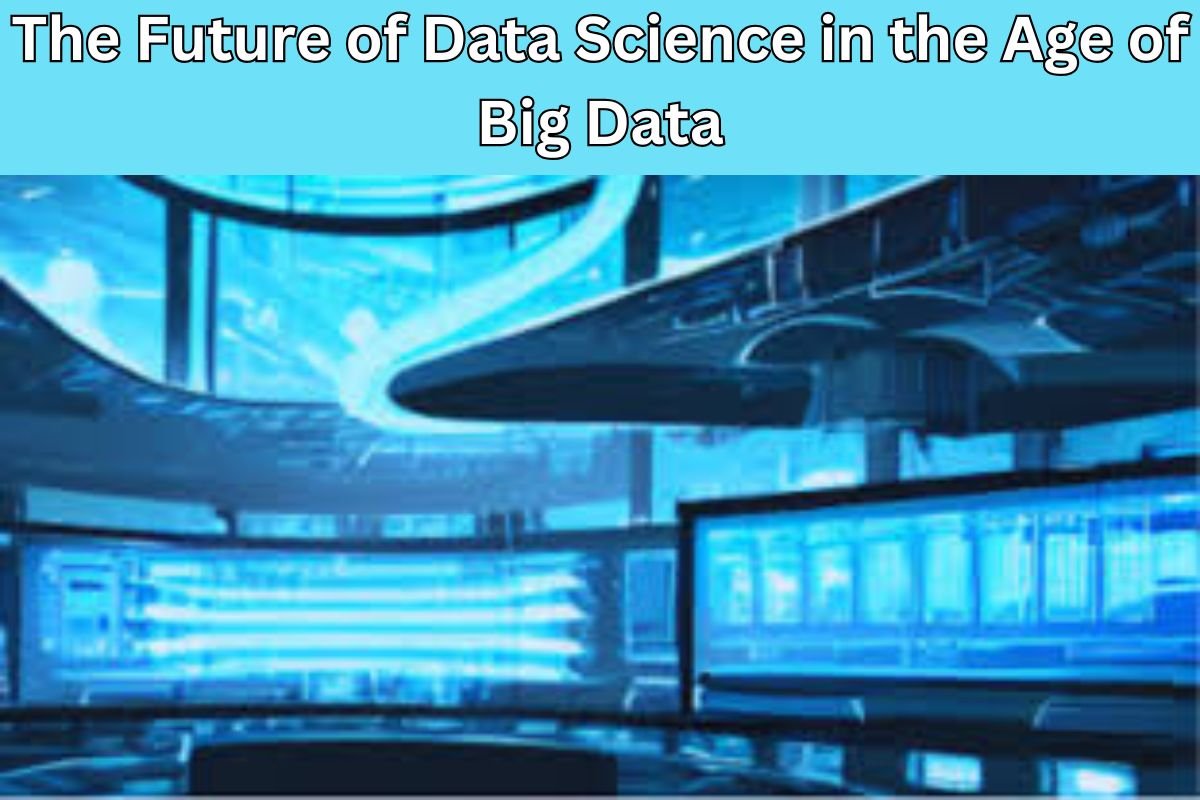The Future of a Data Science in the Age of Big Data
In today’s digital world, data is everywhere, from the social media posts we share to the smart devices tracking our daily activities. This explosion of information is known as “Big Data,” and it is changing the way businesses, governments, and individuals make decisions. But having massive amounts of data is not enough—it’s the ability to analyze and understand this data that is most valuable. This is where Data Science comes in.
Data science, the process of analyzing and interpreting large data sets, plays a crucial role in extracting meaningful insights from Big Data. The combination of data science and Big Data is already reshaping industries like healthcare, finance, marketing, and more.
Future Holds for Data Science in the Age of Big Data
1. The Growing Importance of Data Science
As data continues to grow at an unprecedented rate, data science is becoming more essential than ever. In the age of Big Data, organizations can no longer rely on simple tools or intuition to make decisions. They need advanced analytics to make sense of vast amounts of unstructured and structured data. Data science uses techniques like machine learning, statistical analysis, and data mining to uncover hidden patterns and trends, helping organizations make better decisions and improve performance.
In the future, data science will be at the center of innovation and decision-making, making it a highly sought-after skill. The demand for skilled data scientists is expected to grow, with businesses seeking professionals who can use advanced technologies to gain a competitive edge.
2. Artificial Intelligence and Machine Learning: The Driving Force
Artificial Intelligence (AI) and Machine Learning (ML) are closely tied to data science, and their impact on Big Data will continue to grow. These technologies are transforming how data is analyzed, processed, and used. In the future, AI and ML will likely become even more sophisticated, helping data scientists to automate more complex tasks, such as predictive modeling, anomaly detection, and natural language processing.
For example, AI can be used to identify patterns in healthcare data, enabling early diagnosis of diseases or predicting patient outcomes. Similarly, machine learning algorithms can analyze customer behavior, allowing companies to deliver personalized experiences and improve customer satisfaction.
As AI and ML evolve, data scientists will need to continuously update their skills and stay informed about the latest developments in these fields.
3. Real-Time Data Processing and Decision-Making
In the future, the ability to analyze and make decisions in real-time will become a critical aspect of data science. As Big Data becomes even larger and more complex, organizations will require data scientists who can process massive datasets quickly and efficiently. This is particularly important in industries like finance, where split-second decisions can have a significant impact.
For example, in financial trading, algorithms driven by data science can analyze real-time market data to make immediate trading decisions. Similarly, in logistics and transportation, real-time data analysis can optimize delivery routes, reduce fuel consumption, and minimize delivery times.
The future will likely see an increased focus on real-time data processing, with companies investing in faster, more efficient data infrastructure to support these needs.
4. The Role of Data Privacy and Ethics
As the use of Big Data expands, so do concerns about data privacy and ethics. The future of data science will require a careful balance between innovation and responsibility. With more data being collected from individuals, companies will need to ensure that personal information is handled ethically and in compliance with regulations like the General Data Protection Regulation (GDPR).
Data scientists will play a crucial role in this area by developing privacy-preserving techniques, such as anonymization and encryption, to protect sensitive data. They will also need to be aware of the ethical implications of their work, ensuring that their algorithms and models are fair, unbiased, and transparent.
The future of data science will likely involve a growing emphasis on ethical considerations, with professionals being held accountable for the societal impact of their work.
5. The Integration of Data Science Across Industries
The future of data science will see its integration into almost every industry. Data science has already made significant strides in fields like healthcare, retail, and finance, but its potential is far from fully realized. Industries that have traditionally been slower to adopt new technologies, such as manufacturing and agriculture, are now recognizing the value of data-driven decision-making.
For example:
- In manufacturing, data science can optimize production processes, reduce waste, and improve product quality.
- In agriculture, data analytics can help farmers monitor crop health, predict weather patterns, and manage resources more efficiently.
- In healthcare, data science can assist in personalized medicine, where treatments are tailored to an individual’s unique genetic makeup and medical history.
As more industries embrace data science, the demand for skilled professionals will grow, creating new job opportunities and fostering innovation across sectors.
6. The Rise of Data-as-a-Service (DaaS)
Another trend shaping the future of data science is the rise of Data-as-a-Service (DaaS). Just as software is now available as a service through the cloud, data can also be accessed and analyzed on-demand through DaaS platforms. These platforms provide businesses with access to massive amounts of data without the need to invest in expensive data infrastructure.
DaaS allows organizations of all sizes to leverage Big Data and data science, democratizing access to advanced analytics. In the future, we can expect to see more companies offering DaaS solutions, enabling even small businesses to make data-driven decisions and compete in the market.
7. Collaboration Between Humans and Machines
While AI and automation are expected to play a significant role in the future of data science, human expertise will remain essential. The most successful organizations will be those that foster collaboration between humans and machines. AI can handle repetitive tasks and process vast amounts of data quickly, but human data scientists will still be needed to interpret the results, provide context, and make complex decisions.
In the future, data scientists will work alongside AI systems, using their critical thinking and creativity to solve problems that machines cannot fully understand.
8. The Need for Continuous Learning
As technology advances, the field of data science will continue to evolve. Data scientists will need to keep up with the latest tools, techniques, and trends to stay relevant. This will require a commitment to continuous learning, as new challenges and opportunities emerge.
The future of data science will also involve more collaboration between data scientists and other professionals, such as domain experts, business analysts, and software developers. This interdisciplinary approach will be essential for solving complex problems and driving innovation in the age of Big Data.
Conclusion
The future of data science in the age of Big Data is full of exciting possibilities. With the rapid growth of data, advancements in AI and machine learning, and the increasing demand for real-time insights, data science will continue to be a critical field. Organizations that invest in data science and embrace these trends will be better positioned to thrive in the digital age.
Data scientists, in turn, will need to stay ahead of the curve by continuously learning and adapting to new technologies. As Big Data becomes even bigger, the future of data science promises to be dynamic, impactful, and full of opportunities for those who are ready to take on the challenge. Data Science Training in Noida, Delhi, Gurgaon, and other locations in India will help you prepare for the future of this ever-evolving field.
FAQs on The Future of Data Science in the Age of Big Data
1. What is data science?
Data science is an interdisciplinary field that uses scientific methods, algorithms, and systems to extract insights and knowledge from structured and unstructured data. It combines expertise from statistics, computer science, and domain knowledge.
2. How has big data changed the landscape of data science?
Big data has significantly expanded the volume, variety, and velocity of data available for analysis. This has prompted data scientists to develop new tools and techniques to process and analyze vast amounts of information, leading to more sophisticated insights and predictive analytics.
3. What are some emerging trends in data science?
Key trends include the rise of artificial intelligence (AI) and machine learning, the increasing importance of data ethics and governance, enhanced data visualization techniques, and the growth of automated data science tools that streamline the analytics process.
4. How important is data quality in data science?
Data quality is critical for effective data science. Poor-quality data can lead to inaccurate insights and flawed decision-making. Ensuring data integrity, accuracy, and relevance is essential for successful data analysis and interpretation.
5. What role does machine learning play in data science?
Machine learning is a subset of data science that focuses on developing algorithms that enable computers to learn from data and make predictions or decisions. It is increasingly used in various applications, such as recommendation systems, fraud detection, and predictive analytics.
6. What skills are essential for future data scientists?
Future data scientists should possess a strong foundation in programming (e.g., Python, R), statistics, and data manipulation. Additionally, skills in machine learning, data visualization, and cloud computing are becoming increasingly important as the field evolves.
Also read : https://softnewsdaily.com/what-are-the-most-effective-uses-for-an-air-horn/






